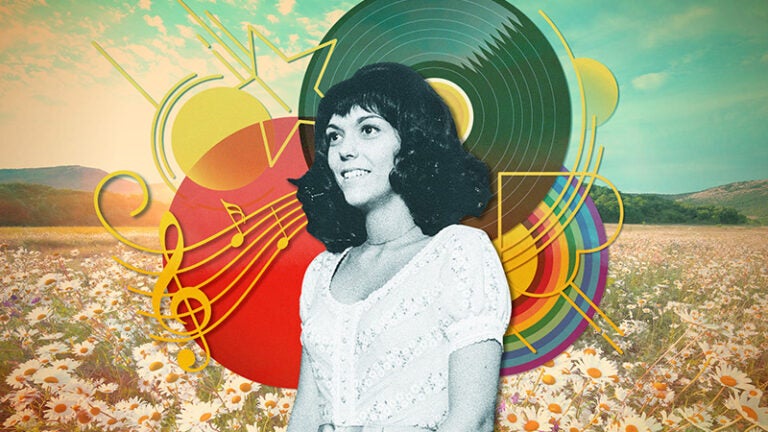
Why is Karen Carpenter’s music still so popular with diverse communities?
Fans of the ’70s musical sensation the Carpenters celebrate the 50th anniversary of the duo’s first album this year. A forthcoming book, Why Karen Carpenter Matters (University of Texas Press), takes a fresh look at Karen Carpenter’s life and why the Carpenters’ chart-topping, seemingly whitewashed musical fantasies of “normal love” have profound significance for people of color, LGBTQ+ communities and anyone outside the mainstream culture usually associated with Karen Carpenter’s legacy.
The book’s author, Karen Tongson, associate professor of English, gender studies, and American studies and ethnicity at USC Dornsife College of Letters, Arts and Sciences, discussed Carpenter’s enduring legacy and her own connection to the artist.
Your new book treads some fresh and interesting ground not just about Karen Carpenter’s life, but her fans.
People familiar with Karen Carpenter are aware of the rough contours of her life story and early death at the age of 32.
What many don’t realize is the enormous impact of the Carpenters’ music on immigrants, people of color and the LGBTQ+ community — people radically different from the image of the Carpenters but who identified deeply with Karen’s voice and story and found solace in her music.
More than that, my book is about why the Carpenters have such an enduring appeal in places like my own country of origin, the Philippines. In other words, Why Karen Carpenter Matters is fundamentally about why she matters to the most unexpected people, in the most unexpected places.
What’s your connection to her?
This question actually gets to the other dimension of how my book offers a different approach to the singer. Why Karen Carpenter Matters is a mixed memoir that combines a biography of Karen with the story of my own musical family and our migration to the California suburbs. In other words, it truly is a tale of two Karens because I was named after her.
My mom and my biological father were both young singers who met in a Manila concert production of Jesus Christ Superstar. All of the frisson of that experience, and of singing together in an act called the Circus Band, led to my coming into the world in 1973 at the very height of the Carpenters’ fame. As teen super-fans of Karen Carpenter, my parents chose her name for me. My mother’s voice was often compared to Karen’s. So I guess you could say my relationship to Karen was overdetermined, starting at birth.

Karen Tongson, associate professor of English, gender studies, and American studies and ethnicity at USC Dornsife. (Photo: Betsy Seder.)
What’s the legacy of Karen’s life and music on society today?
In the 30-plus years since her death, growing numbers have reassessed the Carpenters’ legacy. Listening again to Karen’s voice has changed a lot of minds about whether or not the Carpenters are worthy of our attention, or “cool” enough to like. I hope my book does a decent enough job of illuminating this — I believe Karen’s legacy has been to make people who feel out of place, out of time and far away from the worlds they knew best feel at home in some way.
The longing and nostalgia in not only what she sings about, but how she sings about loss and love has been the source of tremendous comfort to so many immigrant families I know. I can’t tell you how many times people from various backgrounds (especially from Asia and Latin-America) tell me that the first or only records their parents ever owned when they moved to the United States were by the Carpenters.
What’s the biggest misconception about Karen?
I think people overestimate her frailty and underestimate her strength. This is owed in part to the tragic femininity people ascribe to her persona, largely as a result of her struggles with anorexia. In actuality, she was not at all as passive, serious or sad as others have made her out to be. By all accounts, she was a real jokester and prankster who liked to goof around a lot.
How do you explain the Carpenters’ connection with the LGBTQ+ community?
Karen achieved iconicity as a result of her early, tragic death. But I think there’s more to the “diva worship” of Karen than this fact alone. The motif of “impossible love” in much of her music is very resonant with generations of LGBTQ+ people who couldn’t love openly or express their desires without fear of reproach.
Karen also held a tremendous secret for most of her life — the secret struggle of her eating disorder — and I think LGBTQ+ people can identify with what it’s like to struggle with keeping something inside and deemed “abnormal,” with something we cannot share out of fear that we will be cast away by the people we love.
Why do you think the Carpenters may be more popular in your home country than anywhere else in the world?
Music and singing are interwoven into the fabric of everyday life in the Philippines. We’ve also got a powerful attachment to ballads and love songs, which speaks to our residual colonial relationship to the American pop songs we heard on Armed Forces Radio.
But as my book argues, there’s also something more to that musical longing. I believe that the Carpenters’ music, which plays upon memories of the past, or openly longs for brighter worlds and futures filled with love, inspires recognition among those of us who have experienced displacement or alienation, either physically or metaphorically, from the places we call home, and the people we love.
So many Filipinos work overseas and labor under that sense of loss and distance. The capacity to rest in joy, for a moment, in the comfort of her voice, and the sunniness of the Carpenters’ songs allow us to forget that pain momentarily, even as it eventually urges us, again, to remember.